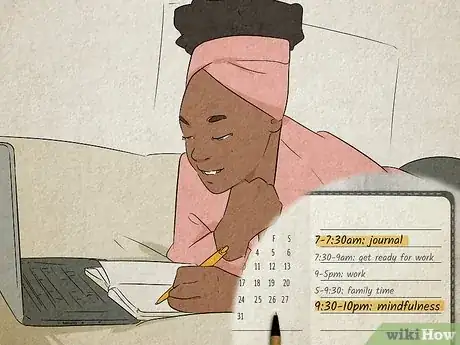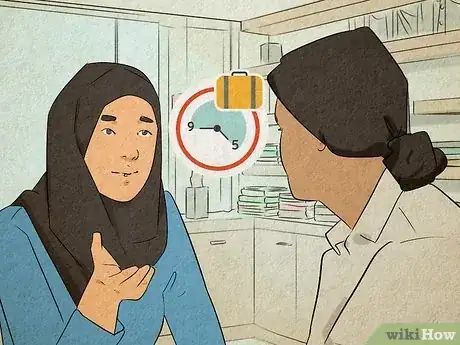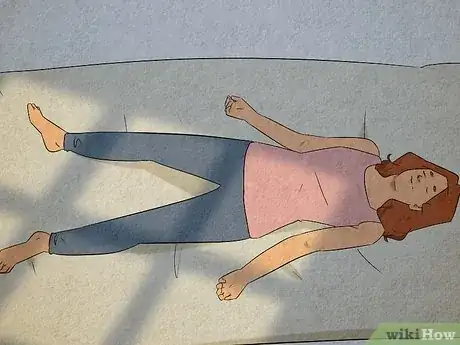This article was co-authored by Ni-Cheng Liang, MD. Dr. Ni-Cheng Liang is a board certified Pulmonologist and the Director of Pulmonary Integrative Medicine at Coastal Pulmonary Associates affiliated with the Scripps Health Network in San Diego, California. She also serves as a Voluntary Assistant Professor of Medicine at the University of California San Diego School of Medicine while volunteering for the UCSD Medical Student-Run Free Clinic for uninsured patients. With over 15 years of experience, Dr. Liang specializes in pulmonary and respiratory medical concerns, mindfulness teaching, physician wellness, and integrative medicine. Dr. Liang received her Doctor of Medicine (MD) from the University of Maryland School of Medicine. Dr. Liang was voted as a San Diego Top Doctor in 2017 and 2019. She was also awarded the 2019 American Lung Association San Diego Lung Health Provider of the Year.
There are 10 references cited in this article, which can be found at the bottom of the page.
This article has been viewed 2,366 times.
If you’re experiencing chronic fatigue and feeling unable to cope with the stress of everyday life, you may be experiencing burnout. Burnout occurs when we fail to adequately manage chronic stressors — such as pressure in the workplace — or when we let the busy pace of our lives keep us from taking care of our basic needs. Since these stressors are part of our everyday lives, simply taking a break from them isn’t always an option. The best way to fight burnout is to prevent it in the first place,[1] so we’ve compiled a list of strategies you can implement in your daily life to prioritize your mental health, effectively manage stress, and make time for yourself. Once you’re back to feeling your best, you’ll be able to keep burnout at bay.
Things You Should Know
- Set aside time every day to prioritize what brings you joy, whether that's taking a hot bath, reading a book outside, or spending time with loved ones.
- Make exercising, eating well, and getting plenty of sleep a priority.
- Practice saying no more. Don't be afraid to set boundaries and not take on new responsibilities. Your mental health comes first.
Steps
References
- ↑ https://www.psychologytoday.com/us/blog/the-playing-field/202101/how-recover-burnout
- ↑ https://www.psychologytoday.com/us/blog/prescriptions-life/201902/why-lack-boundaries-can-lead-burnout
- ↑ https://www.psychologytoday.com/us/blog/prescriptions-life/201902/why-lack-boundaries-can-lead-burnout
- ↑ https://www.psychologytoday.com/us/blog/prescriptions-life/201902/why-lack-boundaries-can-lead-burnout
- ↑ https://www.mindtools.com/pages/article/recovering-from-burnout.htm
- ↑ https://health.clevelandclinic.org/why-downtime-is-essential-for-brain-health/
- ↑ https://www.nhsinform.scot/healthy-living/mental-wellbeing/stress/struggling-with-stress
- ↑ https://www.mayoclinic.org/healthy-lifestyle/consumer-health/in-depth/mindfulness-exercises/art-20046356
- ↑ https://www.mayoclinic.org/healthy-lifestyle/consumer-health/in-depth/mindfulness-exercises/art-20046356
- ↑ https://positive.b-cdn.net/wp-content/uploads/Three-Steps-to-Deep-Breathing.pdf
- ↑ https://www.ncbi.nlm.nih.gov/pmc/articles/PMC5721270/
- ↑ https://www.ncbi.nlm.nih.gov/pmc/articles/PMC6462946/
- ↑ https://www.psychologytoday.com/us/blog/the-playing-field/202101/how-recover-burnout
- ↑ https://www.ncbi.nlm.nih.gov/pmc/articles/PMC8308766/







































































Medical Disclaimer
The content of this article is not intended to be a substitute for professional medical advice, examination, diagnosis, or treatment. You should always contact your doctor or other qualified healthcare professional before starting, changing, or stopping any kind of health treatment.
Read More...